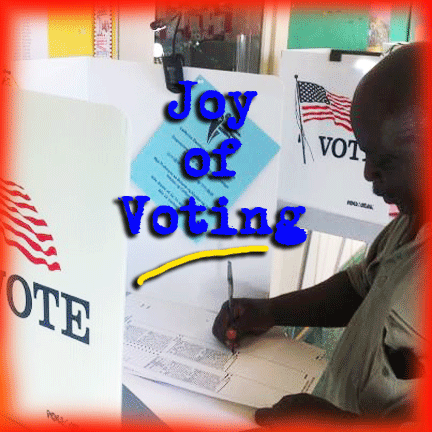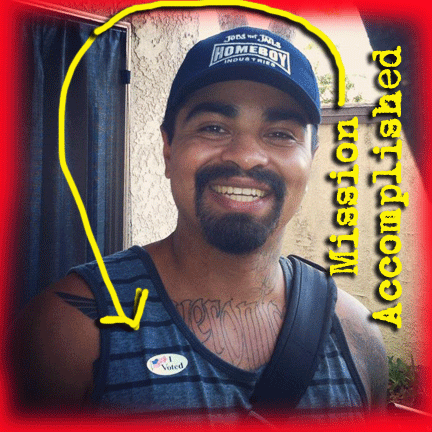Norman Williams, who is in the photo above, was voting for the first time when the picture was snapped. Williams is a former 3-striker who was sentenced to life in prison for a third strike of petty theft. (He stole a floor jack out of a tow truck.) Williams’s other two strikes were not as minor as jacking a jack. But nor did they signal he was a man who so threatened public safety that he needed to be removed from our midst forever and post haste, as the 3-strikes law—passed in 1994– had dictated.
As the NY Times reported in 2010:
In 1982, Williams burglarized an apartment that was being fumigated: he was hapless enough to be robbed at gunpoint on his way out, and later he helped the police recover the stolen property. In 1992, he stole two hand drills and some other tools from an art studio attached to a house; the owner confronted him, and he dropped everything and fled
Fortunately for Williams, in 2005 when Los Angeles DA Steve Cooley had instructed his office to look for 3-strikes cases for whom a 25-to-life sentence clearly didn’t fit, they found Williams, and the Stanford 3-strikes Project at Stanford Law School subsequently agreed to take him on as a client and eventually gained his release.
And so it was that he cast his first vote on Tuesday, and thus was able to vote YES on Proposition 36, the state ballot measure to reform the over-broad law that had once put him behind bars for life. (As it happens, the Stanford 3-Strikes Project co-sponsored the measure.)
On Tuesday night, Prop 36 passed handily, gaining support in both conservative and liberal California counties.
I don’t know Williams personally, but I do know Wil Lopez, a bright, personable man and a former inmate who is now on staff for Homeboy Industries. While not a three-striker, on Tuesday Lopez was another joy-filled first time voter who marked his ballot for Prop 36 with a strong sense of purpose.
Here’s what Lopez wrote about the matter on Facebook on Monday of this week.
“I remember being in the ASU [Administrative Segregation Unit] in Corcoran state prison in 2005 and my cell mate from El monte was telling me how he had received a third strike for possession of burglary tools, which were regular tools in his car, and now he’s sentenced to life. I sat there and said I wish people would change the laws by voting. Wow, it’s been over five years and I never thought this day will come but I can honestly say I’m doing my part. I’m voting tomorrow, first time in my life, I’m f***ing voting tomorrow. Please, friends, go out and vote. Help make a change.”
Above is a photo of a euphoric Lopez taken on Tuesday after his own voting experience.
Luis Aguilar is another man I know who, like Lopez, was never a 3-striker himself, but who, through his own stints in prison, got to know people who were.
“Some guys deserved to be there, but for other guys I saw, it was just a waste of taxpayers’ money,” Luis told me when he called on Tuesday night from his job site to ask if I knew how the various ballot propositions were faring. Aguilar is former gang member who is now married with a family and a good union career working massive construction projects for LA County. Luis works the night shift so he and his wife had voted before he left for the job. He was relieved when I told him it looked like 36 was winning.
“I had this cellie one time when I was locked up who got struck out for stealing three pairs of Levis from Sears,” he said. “His other strikes weren’t nothing violent either. He was just an addict, and when he was using he did stupid stuff.”
Luis first voted in 2004 when he was still on parole and I was writing a series of articles for the LA Weekly about him and his family during his first year out of prison. I remember the seriousness with which he took his newly acquired enfranchisement then, a seriousness that appeared now to have only deepened—as demonstrated when he called multiple times to ask for updates.
He was most interested in Prop. 36, but wanted to know about rest too, especially the union-hobbling Prop. 32 (He was against it), and Prop. 30, Gov. Brown’s sales tax raise to benefit education, which Luis strongly favored. “I voted against everything else that the voting pamphlet said would cost the state more money,” he said. “But on 30 I voted yes, because schools are important.”
In terms of candidates, he voted a straight Democratic ticket, Luis said. “The only time I didn’t look at parties was for DA, then I voted for the lady—I don’t remember her name…”
“Jackie Lacey.”
“Yeah. That’s right. Because I liked the way she talked better than the guy, who looked like he mostly wanted to show he was all tough.”
Luis rang me for the last time Tuesday night just as Obama was beginning his victory speech. He said the radio in the county truck he was driving was broken. I told him CNN had just called a victory for Prop 36, then put him on speaker phone so he could hear the president talk. We listened silently for the duration:
….I believe we can keep the promise of our founders, the idea that if you’re willing to work hard, it doesn’t matter who you are or where you come from or what you look like or where you love. It doesn’t matter whether you’re black or white or Hispanic or Asian or Native American or young or old or rich or poor, able, disabled, gay or straight, you can make it here in America if you’re willing to try.
I believe we can seize this future together because we are not as divided as our politics suggests. We’re not as cynical as the pundits believe. We are greater than the sum of our individual ambitions…
“He was good, right?” Luis asked when Obama had finished and the pundits were beginning their commentary.
I took the phone off speaker and put it back to my ear, muting the TV as I did so. “I thought he was really good,” I said.
There was a pause.
“It feels good to vote,” I said, “It matters.”
“Yep,” he replied. And with that I heard his county-issued walkie-talkie squawk in the background. He thanked me for my help, and he had to go.


